Ask an Expert
Planning the right solution requires an understanding of your project’s security goals. Let Kingston’s experts guide you.
We notice you are currently visiting the UK site. Would you like to visit our main site instead?
Your web browser is out of date. Update your browser now for better experience on this site. https://browser-update.org/update-browser.html

All businesses handle sensitive information at some point in their day-to-day operations, whether in maintaining payroll details for personnel or securely storing intellectual property. But banks, investment firms and other financial institutions handle sensitive information in nearly all aspects of their work. Keeping client financial records secure isn’t just a core part of the service that financial institutions offer – it’s a legal mandate with severe consequences for any mishandling of private data.
These mandates are compounded by the fact that financial institutions are “leading targets of cyber-attacks”, according to the Center for Strategic and International Studies, which further explains that banks are a figurative smorgasbord for cybercriminals, offering “multiple avenues for profit through extortion, theft and fraud”. The financial data held by banks, investment firms and credit unions is especially valuable, as criminals can make quick work of bank account numbers, credit card information and transaction details to steal funds or hold accounts to ransom.
When cybercriminals do strike, the results of an attack are costly, averaging $5.97 million USD – the highest of any industry outside of healthcare. With the potential for identity theft, financial fraud and even corporate espionage, financial institutions must keep their data loss prevention strategies well equipped and up to date. But keeping financial data secure “at rest” is only part of the challenge, as it’s often necessary to transmit data between people and computers, whether across offices or oceans.
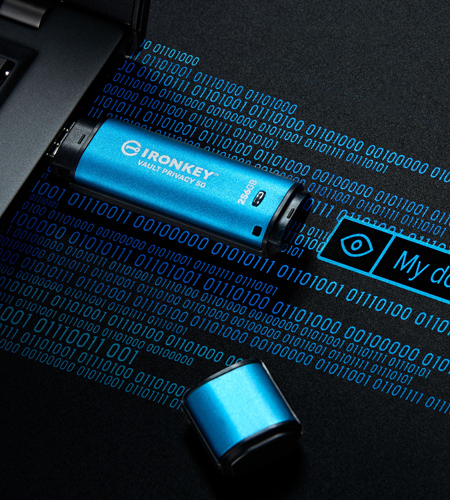
When a computer or poorly-protected storage device with this kind of information is lost or falls into the wrong hands, assessing the damage and protecting customers from the fallout becomes an expensive and time-consuming challenge.
Even USB drives that have been encrypted with a software solution, such as BitLocker and many others, can lull many into a false sense of security. But let’s be clear, using software encryption alone cannot defend against concerted brute force attacks, which can easily crack common passwords in seconds and more complicated passwords in a matter of hours or a few days. That’s why hardware-encrypted drives like the enterprise-grade security Kingston IronKey Vault Privacy 50 series, the Vault Privacy 80 External SSD, and the military-grade security Keypad 200 and D500S are the only type of portable storage that can offer true peace of mind when transporting sensitive financial data.
Because of the drive’s built-in secure microprocessor, the IronKey Vault Privacy 50, 80ES, Keypad 200 and D500S drives are able to detect multiple password attempts (called a brute force attack) and execute a crypto-wipe before hackers can get in. And thanks to the KP200 and D500S drives’ military-grade tamper-resistant epoxy construction, advanced attempts at disassembling the drive to attack its components are rendered virtually impossible without destroying the drive and the encrypted data contained within it.
The consequences of a data breach not only damage a firm’s reputation but also its legal and financial standing. With strict data protection regulations, such as the SEC’s cybersecurity disclosure requirements or the EU’s General Data Protection Regulation (GDPR), sensitive financial data is required to be protected by appropriate measures, such as encryption. Financial professionals should look to hardware-encrypted drives for transporting data without risk to comply with these regulations and avoid significant fines and legal penalties.

For international business travellers in the finance industry, the potential vulnerability of exposing sensitive data is heightened, especially in destinations with more intense digital restrictions. In some countries, an employee’s personal device may be required to be unlocked and possibly imaged by authorities for further investigation. This presents a significant risk for breach of confidential client information or a firm’s intellectual property. The use of a hardware-encrypted IronKey USB drive and external SSDs can provide more data protection than a laptop or phone. While those devices can be legally confiscated for a period of time, encrypted drives can be forfeited to authorities with strong confidence that data will remain protected and inaccessible.
Considering the value of the assets handled by financial institutions, as well as the swathes of personal data key to their operations, those responsible for data protection within the finance sector have to seriously invest in data protection and empower their employees with the right tools to do so before the consequences of a breach or hack begin to be realised. Hardware-encrypted IronKey drives are critical tools for maintaining data security without complicating existing data workflows.
By protecting sensitive financial data with a trusted solution while in transit and at its most vulnerable, financial institutions can shore up their cybersecurity defences and, more importantly, prevent costly attacks before they happen.
So, whether you are a finance entity spanning a country or continent or a truly global financial services organisation, Kingston IronKey offers a vast range of hardware-encrypted drives suited to the unique circumstances of finance. And as a result, these drives can make the difference in providing relatively inexpensive insurance to guard against data loss and theft vs the high price-tag impacts of breaches, no matter where you happen to be working.
#KingstonIsWithYou #KingstonIronKey
Was this helpful?

Planning the right solution requires an understanding of your project’s security goals. Let Kingston’s experts guide you.
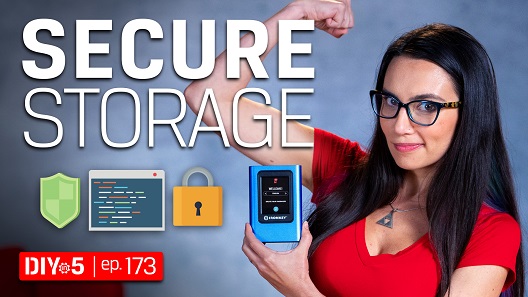
For creatives that produce content for high-profile clients, encrypted storage can secure your important files and help you fulfil your security responsibilities.
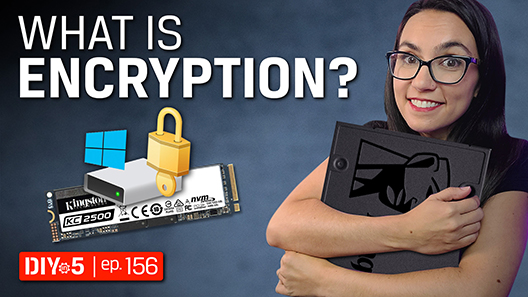
There are two main types of encryption - software encryption and hardware encryption.
No products match your current filter selection. Try adjusting your filters to explore more options.

Looking for improved data security & need to know what is encryption? Kingston covers the basics.

Hardware, not software-based password protection, is the best way to protect files and drives.

Secure important personal and private information on a PC with a hardware-encrypted SSD.

Breaches remain a major threat. Explore the need for comprehensive cybersecurity measures.

Here is a list of USB security features to consider for data protection.

Learn what the 3-2-1 data backup method is and why it is your best defence against ransomware.
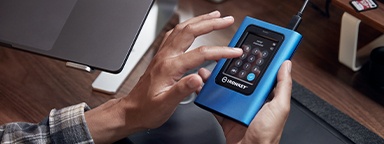
Learn data security best practices with Dr. Vynckier, and the importance of offline backups.

David Clarke covers encryption, super user safeguards, vulnerability management, and training.

Learn how Kingston IronKey's solutions helped EgoMind enhance their data security hygiene.

Built for disparate purposes, client SSDs and enterprise SSDs have different properties.

We discuss NIS2 and DORA, and how organisations can turn compliance into an opportunity.

We discuss the shifts in how organisations are storing and encrypting sensitive data.

Kingston examines how to secure sensitive files with the increasing vulnerability of email.

Learn how Kingston IronKey hardware-encrypted solutions supports NIS2 Directive compliance.

Kingston IronKey has hardware options to protect small and medium businesses against cybercrime.

FIPS 140-3 Level 3 is certified by the world-leading agency NIST as the apex of encryption.

Questions to ask when seeking the right SSD for your organisation’s data center.

Our infographic showcases the differences between software and hardware-based encryption.

2023 has been a year full of challenges and innovations. But what will 2024 bring?

Learn about two methods that give SMBs superior resilience vs ransomware: encryption and backups.

In this whitepaper, we explain how to enforce a DLP strategy, while allowing USB drive use.

Enterprise-grade and military-grade digital security: two high standards with different requirements.
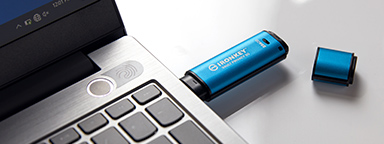
Learn how hardware encryption can protect a travelling lawyer’s confidentiality with secure file storage.

How is pen testing ensuring Kingston IronKey USB drives lead the way in trusted data security?

Hardware encrypted Kingston IronKey drives protects organisations’ data on the move.

Bring your own device (BYOD) policy is tricky for employers. How to balance security & convenience?

DLP offers tools for network admins to protect sensitive data from cybercrime and negligence.

A look at how the requirement for data encryption can be key to any organisation's security strategy.

How can we bolster network security with remote working and international travel so common now?

Invest in encrypted drives so you do not incur expensive legal fees if they are lost or stolen.

Discover why national security agencies trust Kingston IronKey to protect their data.

A company’s IT specialists should be expected to add data security to the PCs of remote workers.

Kingston’s three key practices for robust DLP for businesses that handle sensitive data.

You can read and write to an encrypted USB flash drive with an iPad or iPhone with the right adaptor. Here’s how.

Learn why hardware encryption beats software encryption for law firm data protection.

A brief explaining the purpose and types of data security software available.

Passphrases are superior to complex passwords for keeping data secure, with many powerful benefits.

HIPAA requires healthcare organisations to keep patient data safe at all times, including in transit.
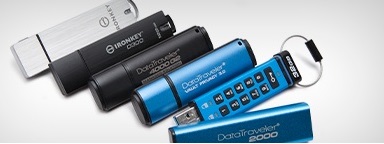
This requires encryption of sensitive data, appointing a Security Officer, cyber security programmes and policy adoption.

Kingston IronKey encrypted USBs are a security consideration for organisations of all sizes.

We compare unencrypted and encrypted USB drives and explain how to keep data secure!

Learn how Kingston IronKey is protecting the intellectual property with customisation.

Discover why Kingston IronKey is the go-to solution for protecting financial services data.

Learn how Kingston IronKey is securing the military operations’ data.
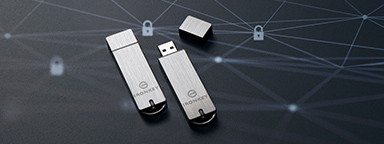
How can you get your organisation to use encrypted drives and make them part of your security policy? Here are some tips.

Learn how Kingston IronKey is protecting telecoms industry's data using encryption.

Encryption is an incredibly helpful option for creatives to protect their clients’ important files.

Kingston IronKey encrypted USBs: a small but important part of any organisation’s security strategy.

Kingston IronKey can help mitigate data loss due to the rise in lost electronic devices.

In this eBook, we explore how Encrypted USB drives have become a key tool in keeping data secure.
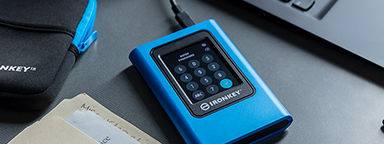
How to use your IronKey Vault Privacy 80 External SSD: set password, connecting to a PC and more.

Organisations are considering data security options to protect against private mobile data breaches.

Discover how Kingston IronKey is protecting the sensitive data of the finance sector.

Here is how Kingston IronKey helped protect the sensitive data of the Energy industry.

We explore our KingstonCognate experts’ thoughts on cyberthreats and cybersecurity challenges.

Protecting data on the move with superior hardware-based Advanced Encryption Standard (AES) 256.

Users can disable software-based encryption, which can lead to legal fees if the drive is lost.

We explore Tomasz Surdyk's thoughts on how all entities can stay secure in the digitised world.

Don’t plug any USB drives into your computer if you don’t know exactly where they came from.

What we learned from Kingston’s experts and tech influencers on work-from-home enablement Twitter chat.

There are benefits to using both cloud storage and hardware-based encryption.

We explore the top 12 tips small and medium size enterprises can take to enhance cybersecurity.

We’ve examined several factors using unique research to identify what may impact markets globally in 2022.

2021 has been a year full of challenges and innovations. But what will 2022 bring?

Prof Sally Eaves shares her thoughts on the SME cybersecurity landscape and the need for education & support.

Bill Mew shares his thoughts how the largest security challenges need commitment from the boardroom.

Rob May shares his thoughts on how close we are to edge computing and the security it requires.

The pandemic has increased internet traffic, which has placed importance on the role of data centers.

The use of DLP software, VPNs, Encrypted SSDs and USBs, will help mitigate some risks of remote working.
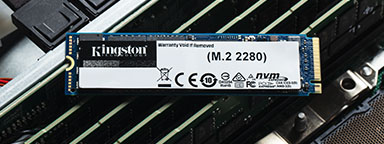
Cameron Crandall of Kingston helps you decide if you should move to your server storage to NVMe SSDs.

There are many advantages to using a dedicated hardware encryption processor in USB flash drives.

What will 2021 bring in Tech and trends? What do our KingstonCognate members and industry experts predicting for the future?

Cyber security and data privacy are everyone’s responsibility. What are the key considerations?

Learn why the future of business depends on SSD-enabled SDS, and how SSD fits into a Software Defined Storage Solutions.

Kingston & Matrix42 partnered to give optimal endpoint security solution in multiple sectors to mitigate risks.

The importance of organisations to consider Revenue, Profit & Risk as equal in organisations to ensure they mitigate data security & cyber security risks. Read this article from Industry Expert, Bill Mew & he will provide you with an insight on this topic.
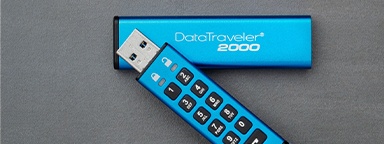
What do industry experts think has changed since the introduction of GDPR?
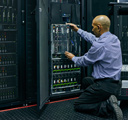
Data centres should be using server SSDs. There are many benefits over client drives and costs have come down.

NVMe is now the standard protocol for SSDs to empower data centres and enterprise environments.

Cloud and on-premise data centre managers can learn a lot from supercomputing.
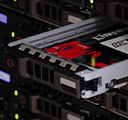
Find out how Hardwareluxx were able to manage the growth of their web traffic using Kingston's DC500M SSD.

SDS hasn’t lived up to its hype but now that NVMe is more affordable, the commodity hardware is ready to deliver.

Choosing the right SSD for your server is important since server SSDs are optimized to perform at a predictable latency level while client (desktop/laptop) SSDs are not. These difference result in better uptime and less lag for critical apps and services.

To work from home you need a good workspace for your PC, the right conferencing gear, and a secure connection.
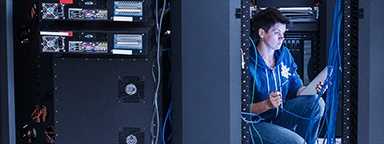
What strategies can organisations use to best secure customers data in a post-GDPR world with the ever-evolving nature of cyber security threats? Kingston pooled the knowledge of some of the UK’s most experienced commentators in cyber security to discuss how data protection has changed since the introduction of GDPR.
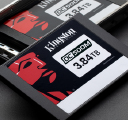
This whitepaper demonstrates how using Kingston Technology’s Data Centre DC500 SSDs can reduce your overall capital and licence costs by 39%.

You already know that remote working is a business enabler. But the challenges posed to your network security and compliance with GDPR are too big to ignore.

How to enable and disable Microsoft’s BitLocker eDrive feature to leverage hardware encryption on your Kingston SSD.

Some of Kingston and IronKey's Secure USB Flash drives are powered by partners, licensed technology, or services.
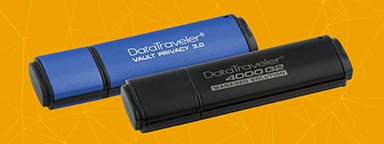
256-bit AES hardware-based XTS block cipher mode encryption is used in DT 4000G2 and DTVP 3.0.
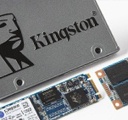
Firmware/hardware PFAIL protection is an highly effective method for preventing data loss in enterprise SSD.

Kingston datacenter SSDs provide excellent resiliency to protect sensitive data in OLTP workloads.

HPC can require massive amounts of data. SSDs consume a fraction of the power of their spinning disk.
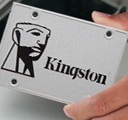
End-to-End Data Protection protects customer’s data as soon as it is transferred by the host system to the SSD, and then from the SSD to the host computer. All Kingston SSDs incorporate this protection.
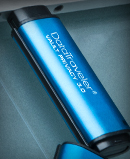
This program offers the options most frequently requested by customers, including serial numbering, dual password and custom logos. With a minimum order of 50 pieces, the programme delivers precisely what your organisation needs.

Everyday working life has changed radically and so have traditional ways of working: thanks to mobile storage media, we can access our data practically at any time from any location, and can work on our data wherever we are.
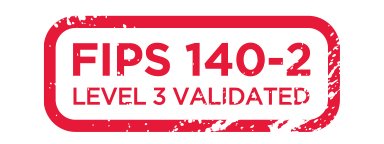
Most IronKey and Kingston secure USB flash drives are FIPS 140-2 Certified.
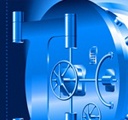
Heathrow Airport in London (30 October 2017) uses unencrypted USB drives for its non-cloud storage. Unfortunately, it was not standardized on encrypted USB drives.

Storage can be the most challenging component for VDI performance.

Testing is a cornerstone of our commitment to deliver the most reliable products on the market. We perform rigorous tests on all of our products during each stage of production. These tests ensure quality control throughout the entire manufacturing process.



